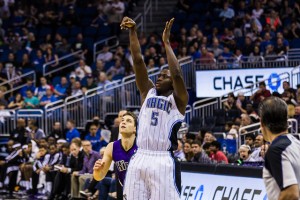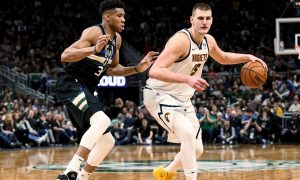The 2000 NBA Draft has routinely been derided as the one of the worst in history. The best players from that draft (Kenyon Martin, Michael Redd) were barely fringe All-Stars and only a small percentage of the others (with Mike Miller, Hedo Turkoglu, and Jamal Crawford the most notable) carved out significant NBA careers. So it should be no surprise that the 2001 Rookie of the Year “race,” which featured Miller beating out Martin and Marc Jackson (the Temple version), was about as inspiring as turtle racing at a County Fair.
This season’s rookie crop may not turn out to be as poor as the one in 2001, but the contest for the best inaugural performance won’t be fondly remembered. In fact, the media conversation has focused more on the struggles of those not in contention than that of the most likely winners.
Playing time has been hard to come by for this group: to date only nine of the 60 players drafted are receiving over 20 minutes per game. In all fairness, injury recovery and slow development of expectedly raw talent has been a factor in the overall performance of the lottery selections. Otto Porter (Washington Wizards), Alex Len (Phoenix Suns), Nerlens Noel (Philadelphia 76ers), and C.J. McCollum (Portland Trail Blazers) have all been significantly slowed by injuries and should have larger impacts in years to come. The raw talent of Anthony Bennett (Cleveland Cavs), Cody Zeller (Charlotte Bobcats), Ben McLemore (Sacramento Kings), and Giannis Antetokounmpo (Milwaukee Bucks) also bears watching.
With the bad news out of the way, three players from this year’s rookie class have separated themselves from the rest of the pack and will likely vie for the top honor. All three are guards and not surprisingly all play for some of the weakest teams in the league. So without further ado, this year’s nominees are:
Michael Carter-Williams (Philadelphia 76ers): 16.8 points, 5.6 rebounds, 6.3 assists, 2.0 steal, 0.7 blocks
The early front runner (by a narrow margin), Michael Carter-Williams, led the 76ers to a nice start to the season, narrowly missing a rare quadruple-double in only his first game. His statistical performance is a testament to his well-rounded skills, excellent size and his high usage. His defensive potential was a bit unknown as it’s difficult to get a read on players from Syracuse’s unique system but he has the physical abilities to develop into an above average defender, particularly once he has Noel protecting the rim behind him. Unfortunately, his awful shooting and overmatched teammates have seen a pleasant start to the season quickly turn into a nightmare. His performance has dipped slightly since the All-Star break but he has provided one of the few bright spots for Philly fans in an otherwise dismal season.
Victor Oladipo (Orlando Magic): 13.9 points, 4.3 rebounds, 4.0 assists, 1.6 steals, 0.6 blocks
The Magic drafted Victor Oladipo to man one of their backcourt spots and have played him at both positions over the course of the season. He was highly valued for his athleticism, defense, and character and all these traits have been on display during the course of the season. Like Carter-Williams, Oladipo is capable of producing versatile stats while controlling the ball for a poor team. While Victor’s stats are slightly less impressive, his terrific defensive skills and slowly improving perimeter game may give Oladipo the current edge in value to his team, which is almost as bad as the 76ers.
Trey Burke (Utah Jazz): 12.6 points, 3.2 rebounds, 5.4 assists, 0.5 steals, 0.1 blocks
Trey Burke returned from an early season injury to display the skill set that had many viewing him as an NBA-ready point guard. With a game built around leadership and craftiness rather than physical skills, Burke’s future lies in balancing when to score with his above average court vision. He isn’t an explosive athlete who dominates in any facet of the game but he turns the ball over infrequently. When his shooting improves he should be a much more effective offensive threat. Burke’s physical limitations will be a major obstacle to his becoming more than an average defender but he has the smarts to at least minimize his defensive limitations. Utah has some good young talent and a great deal of cap space so Burke should be in a good position to lead a better team soon.
And the winner is …

Image courtesy of RMTip21/Flickr.
Victor Oladipo. Burke probably isn’t a threat to win unless he blows up over the last 20 games, which means it’s likely a two-man race. While Carter-Williams has the more impressive raw stats, Oladipo is a far better two-way player, has improved as the season has progressed, and has less of the empty-stats-on-an-awful-team vibe. In terms of long-term potential, it’s still entirely possible that none of these three players is the most successful member of the 2013 draft class. For now, in this less-than-memorable rookie year, Victor’s season narrowly edges him to the top of the class.
My All Rookie Teams
First Team
Michael Carter-Williams, Philadelphia 76ers
Victor Olapido, Orlando Magic
Trey Burke, Utah Jazz
Tim Hardaway, New York Knicks
Giannis Antetokounmpo, Milwaukee Bucks
Second Team
Pero Antic, Atlanta Hawks
Nate Wolters, Milwaukee Bucks
Kelly Olynyk, Boston Celtics
Nick Calathes, Memphis Grizzlies
Ben McLemore, Sacramento Kings














